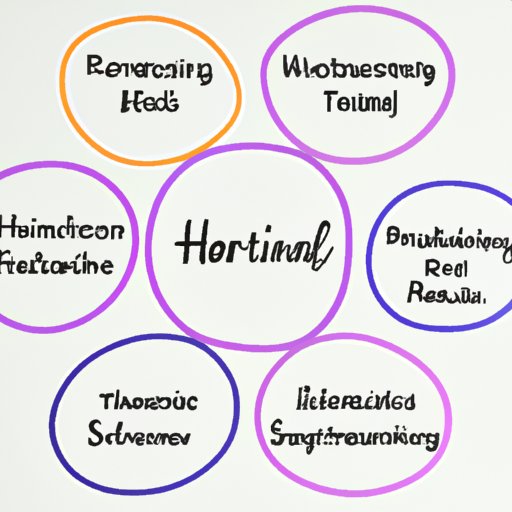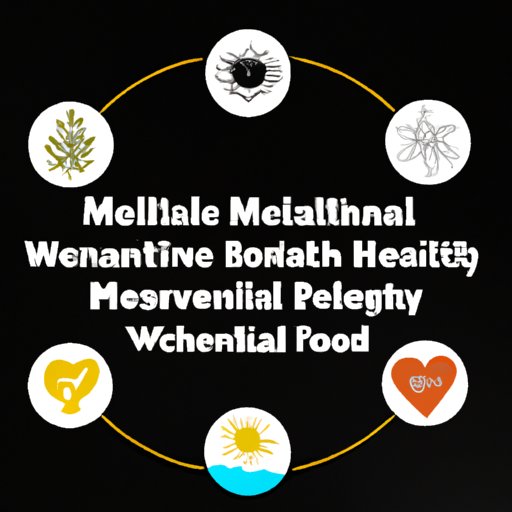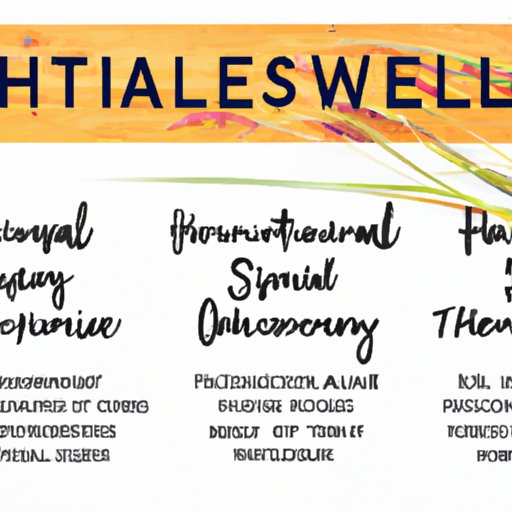Introduction
Holistic wellness is an approach to health and wellbeing that takes into account the physical, mental, emotional, spiritual, and social aspects of life. This concept emphasizes the interconnectedness of all these different aspects and the importance of creating balance in order to achieve optimal health and wellbeing.
The benefits of holistic wellness include improved physical and mental health, enhanced quality of life, and increased resilience. By taking a holistic approach to health and wellbeing, individuals can gain a better understanding of their personal needs and develop a plan of action to ensure they are meeting those needs.
In this article, we will explore what holistic wellness is and how to create a personalized plan to support it. We will also discuss the different types of holistic wellness practices, the role of nutrition in holistic wellness, and the connection between holistic wellness and self-care.
A Guide to Creating a Holistic Wellness Plan
Creating a holistic wellness plan involves assessing your current lifestyle, developing goals for your holistic wellness plan, and choosing the right practices for you. Here are some tips to help you get started.
Assessing Your Current Lifestyle
The first step in creating a holistic wellness plan is to assess your current lifestyle. Take time to reflect on how you currently spend your time and energy. Consider how much time you spend engaging in activities that promote physical, mental, emotional, spiritual, and social wellbeing. Make note of any areas where you feel you could use improvement or additional support.
Developing Goals for Your Holistic Wellness Plan
Once you have assessed your current lifestyle, it’s time to set goals for your holistic wellness plan. Think about what you would like to accomplish in terms of physical, mental, emotional, spiritual, and social wellbeing. Consider both short-term and long-term goals and be sure to make them realistic and achievable.
How to Choose the Right Practices for You
Once you have identified your goals, it’s time to choose the right practices to help you achieve them. There are many different types of holistic wellness practices, so take time to explore what works best for you. Consider what type of activities you enjoy and which ones you find most beneficial. It’s important to choose practices that you can realistically incorporate into your lifestyle.

Exploring the Different Types of Holistic Wellness Practices
Holistic wellness involves engaging in activities that promote physical, mental, emotional, spiritual, and social wellbeing. Here are some examples of holistic wellness practices that you may want to consider incorporating into your plan.
Mind-Body Practices
Mind-body practices involve activities that promote physical and mental wellbeing, such as yoga, meditation, tai chi, and qigong. These practices can help to reduce stress, improve focus, and enhance overall wellbeing.
Spiritual Practices
Spiritual practices involve activities that promote spiritual growth and connection, such as prayer, journaling, and attending religious services. These practices can help to foster a sense of purpose and connection to something greater than oneself.
Social Practices
Social practices involve activities that promote social connection, such as spending time with friends and family, volunteering, and joining social clubs. These practices can help to foster a sense of community and connection to others.

Understanding How Holistic Wellness Can Improve Your Mental Health
Engaging in holistic wellness practices can have a positive impact on mental health. Here, we will explore the benefits of holistic wellness on mental health and strategies for integrating holistic wellness into mental health treatment.
The Benefits of Holistic Wellness on Mental Health
Research has shown that engaging in holistic wellness practices can have a positive impact on mental health. Mind-body practices, such as yoga and meditation, can help to reduce stress and anxiety. Spiritual practices, such as prayer and journaling, can help to foster a sense of peace and connection to something greater than oneself. Social practices, such as spending time with friends and family, can help to foster a sense of community and connection to others.
Strategies for Integrating Holistic Wellness into Mental Health Treatment
When it comes to treating mental health conditions, holistic wellness should be part of the treatment plan. Talk to your healthcare provider about incorporating holistic wellness practices into your treatment. They may be able to provide resources and support to help you get started.
The Role of Nutrition in Holistic Wellness
Nutrition plays an important role in holistic wellness. Here, we will explore the benefits of eating a balanced diet and different dietary approaches.
The Benefits of Eating a Balanced Diet
Eating a balanced diet is an important part of holistic wellness. A balanced diet consists of a variety of healthy foods from all the food groups, including fruits, vegetables, whole grains, proteins, and dairy. Eating a balanced diet can provide essential nutrients to the body, help to maintain a healthy weight, and reduce the risk of chronic diseases.
Exploring Different Dietary Approaches
There are many different dietary approaches that can be used to support holistic wellness. Some of these approaches include vegetarianism, veganism, and the paleo diet. Consider talking to a nutritionist or dietitian to determine which approach may be best for you.

Strategies for Incorporating Holistic Wellness into Your Life
Incorporating holistic wellness into your life can be challenging. Here are some strategies to help you make holistic wellness a part of your daily routine.
Making Time for Holistic Wellness Practices
Making time for holistic wellness practices is key to achieving your goals. Set aside time each day to engage in activities that promote physical, mental, emotional, spiritual, and social wellbeing. This could include anything from meditating to going for a walk to spending time with friends.
Finding Support from Others
Finding support from others can help to keep you motivated and accountable. Consider joining a support group or finding an accountability partner who can encourage you and help you stay on track.
Making Small Changes to Achieve Big Results
Making small changes to your lifestyle can help you make progress towards your goals. Start by making one small change at a time and build on that. Over time, these small changes can add up to big results.
Exploring the Connection Between Holistic Wellness and Self-Care
Self-care is an important component of holistic wellness. Here, we will explore the benefits of practicing self-care and strategies for incorporating self-care into your holistic wellness plan.
The Benefits of Practicing Self-Care
Practicing self-care is an important part of holistic wellness. Self-care involves engaging in activities that promote physical, mental, emotional, spiritual, and social wellbeing. Examples of self-care activities include getting enough sleep, exercising, eating a balanced diet, and taking time for yourself.
Strategies for Incorporating Self-Care into Your Holistic Wellness Plan
When creating a holistic wellness plan, it’s important to incorporate self-care activities. Set aside time each day to engage in activities that promote physical, mental, emotional, spiritual, and social wellbeing. Make sure to make time for activities that bring you joy and make you feel good.
Conclusion
In conclusion, holistic wellness is an approach to health and wellbeing that takes into account the physical, mental, emotional, spiritual, and social aspects of life. Creating a holistic wellness plan involves assessing your current lifestyle, developing goals for your holistic wellness plan, and choosing the right practices for you. Holistic wellness practices can have a positive impact on mental health and nutrition plays an important role in holistic wellness. Finally, self-care is an important component of holistic wellness and should be incorporated into your plan.
By taking a holistic approach to health and wellbeing, individuals can gain a better understanding of their personal needs and develop a plan of action to ensure they are meeting those needs. With dedication and commitment, individuals can create a holistic wellness plan that supports their health and wellbeing.
Summary of Key Points
• Holistic wellness is an approach to health and wellbeing that takes into account the physical, mental, emotional, spiritual, and social aspects of life.
• Creating a holistic wellness plan involves assessing your current lifestyle, developing goals for your holistic wellness plan, and choosing the right practices for you.
• Holistic wellness practices can have a positive impact on mental health and nutrition plays an important role in holistic wellness.
• Self-care is an important component of holistic wellness and should be incorporated into your plan.
• By taking a holistic approach to health and wellbeing, individuals can gain a better understanding of their personal needs and develop a plan of action to ensure they are meeting those needs.
Final Thoughts
Holistic wellness is an approach to health and wellbeing that takes into account the physical, mental, emotional, spiritual, and social aspects of life. By taking a holistic approach to health and wellbeing, individuals can gain a better understanding of their personal needs and develop a plan of action to ensure they are meeting those needs. With dedication and commitment, individuals can create a holistic wellness plan that supports their health and wellbeing.
(Note: Is this article not meeting your expectations? Do you have knowledge or insights to share? Unlock new opportunities and expand your reach by joining our authors team. Click Registration to join us and share your expertise with our readers.)
